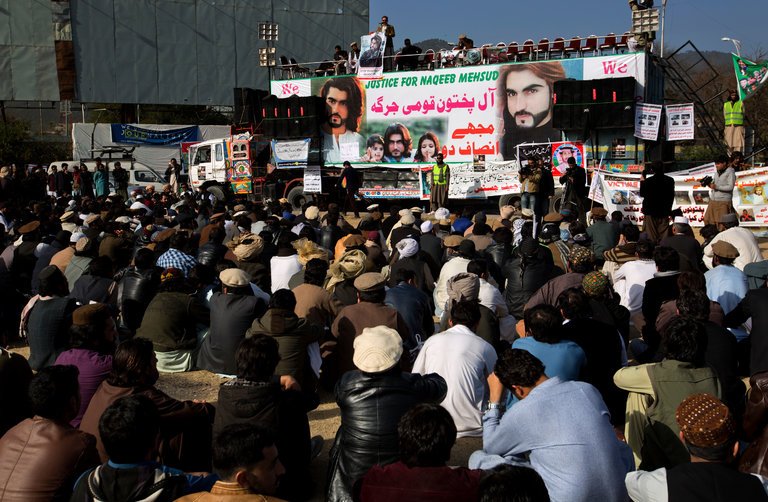
The murder of a young Pashtun shopkeeper, Naqeebullah Mehsud, in a fake police encounter on January 13 in the financial heart of Pakistan, Karachi, has led to what is being referred to as the Pashtun Long March: Since February 4 thousands of Pashtun activists have gathered outside the press club in Islamabad chanting the slogan of Azadi (Freedom) and highlighting human rights violations against their community.
Pashtuns from Waziristan started the march on January 26 and were joined by 10,000 fellow Pashtuns from Khyber Pakhtunkhwa and Baluchistan. According to a report in Gandhara RFERL “In a series of emotional speeches, speaker after speaker ran through their grievances and called on the government to act. “Naqeebullah Mehsud was not the first Pashtun killed unlawfully in this country. A lot of our blood has been spilled,” protest organizer Manzoor Ahmad Pashteen thundered from the top of a metal shipping container used as a makeshift stage. “However, our patience has now run out after this killing.” Pashteen, an activist who has spent years lobbying to draw attention to the plight of his Mehsud tribe, is among the campaigners determined not to leave Islamabad until their demands are met.”
According to former Senator Afrasiab Khattak “Pashtuns in FATA in general and Waziristan in particular have been devastated by the armed conflict, but their sufferings and agonies remain unnoticed,” he said. “Rapid urbanization, education, remittances, and the rise of professionals and the middle class have led to greater awareness, but the process of political empowerment lags far behind.” “Khattak says Islamabad’s failure in implementing reforms in FATA contributes to resentment as the region still languishes under a draconian colonial-era legal regime known as the Frontier Crimes Regulations. He says youth activism has taken seasoned politicians by surprise and the masses appear to be now mobilizing for their rights. This, he says, is also changing perceptions about Pashtuns as a collection of warlike tribes. “Such stereotypes are being shattered by the most peaceful and disciplined political agitation in Islamabad’s recent history,” he noted.”
The Human Rights Commission of Pakistan called upon the Government of Pakistan to take notice of this protest and to listen to and address any legitimate demands. In a statement issued on Tuesday February 6, 2018, the Commission said:
“HRCP is dismayed at the apathy of the federal government towards the people of Waziristan, hundreds of whom have been protesting in Islamabad since 1st February 2018.” “The murder of Naqeebullah Mehsud in a fake encounter by the police in Karachi on 13th January 2018 has stirred up grievances of Pashtuns in general and of the people of FATA in particular. Thousands of activists from all over the country have come to Islamabad to participate in the protest that began on 1st February. The protesters have made five demands which include the immediate arrest and prosecution of Rao Anwar; the police official accused of murdering Naqeebullah Mehsud, investigations into extra-judicial killings in Karachi and elsewhere in the country, stopping of enforced disappearances and recovery of missing persons with the demand of producing them in courts and the release of individuals who are not guilty of any crimes, an end to the collective responsibility punishments meted out to entire villages, sub-tribes and tribes after any illegal, militant or criminal activities in Waziristan and FATA and the clearing of landmines in Waziristan and FATA.”
Further, “HRCP has always maintained that it is imperative that Pakistan ensures due process of law for all of its citizens as per its obligations under the Constitution and the international human rights treaties to which it is a signatory. Thorough and impartial probes must be conducted into illegal detentions, enforced disappearances and extra-judicial killings and the law should be enforced against the perpetrators of such acts.” “It is the state’s responsibility to ensure that the areas that have been declared clear are truly safe for the internally displaced persons from FATA to return to. Reports of incidents of injuries and deaths because of landmines in South Waziristan and other parts of FATA are very alarming. Authorities must take immediate notice of this very serious issue and begin working on measures to clear all such areas from landmines to ensure the safety of the local residents.”
HRCP also demanded an end to the delays in implementation of FATA reforms that “have added significantly to the frustrations and miseries of the people of FATA as they continue to languish under the draconian Frontier Crimes Regulations (FCR). The federal government must not delay the process of reforms in FATA any further.”
More from the Gandhara RFERL report
“It’s no surprise that clearing the deadly landmines is one of the protesters’ demands. An estimated half a million Mehsuds left their homes before the onset of a major Pakistani military offensive in 2008, and nearly 80 adults and children have reportedly been killed in landmine explosions since most Mehsuds returned to their homes by the end of last year. In a telling revelation about life in a conflict zone, the protesters are demanding an end to curfew and other coercive measures used after attacks against security forces. “Across FATA and Waziristan in particular, authorities should avoid imposing curfews and beating civilians,” the pamphlet said, referring to the Federally Administered Tribal Areas by its acronym.”
![]()






[…] Human Rights Commission of Pakistan called upon the Government of Pakistan to take notice of this protest and to listen to the demands. […]
Comments are closed.